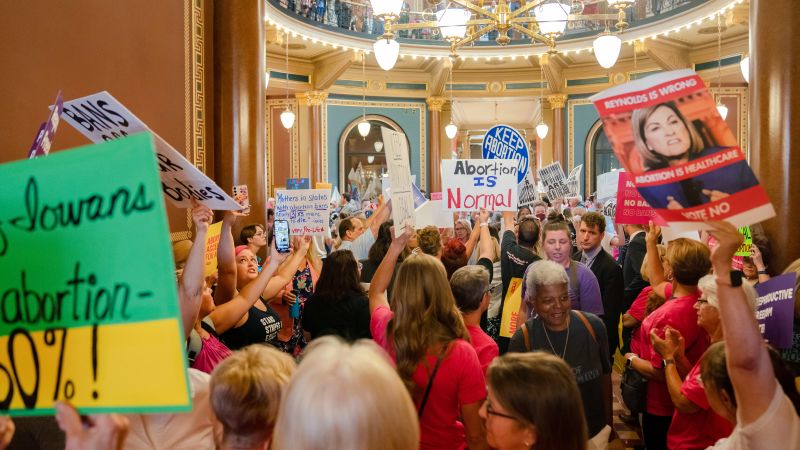Iowa’s Newly Signed Abortion Ban Temporarily Blocked by Judge
A judge in Iowa has temporarily blocked a newly signed law that would ban abortions as early as six weeks into a pregnancy. This means that abortions in Iowa will remain legal up to 22 weeks into a pregnancy for now. The law will be placed on hold until a final decision is issued by the court.
Legal Action by Advocacy Groups
Planned Parenthood of the Heartland, the Emma Goldman Clinic, and the American Civil Liberties Union of Iowa filed a lawsuit to block the law from going into effect immediately. They took action just hours after the bill was sent to Republican Gov. Kim Reynolds’ desk. The judge’s ruling grants a temporary injunction, preventing the law from being enforced.
Guidelines for Physicians
While the law is on hold, Iowa’s board of medicine will begin drafting guidelines on how physicians would be punished for violating the law. The judge believes that having these rules in place would benefit both patients and providers if the injunction is ultimately dissolved.
Background on the Law
The law, signed by Gov. Reynolds, was passed after a special legislative session focused on restricting abortion in the state. It prohibits physicians from providing most abortions after early cardiac activity can be detected, which is typically around six weeks into pregnancy. However, there are exceptions for miscarriages, threats to the pregnant woman’s life, fetal abnormalities, and pregnancies resulting from rape or incest.
Reynolds’ Response and Potential Supreme Court Appeal
Gov. Reynolds expressed disappointment with the temporary injunction and promised to take the case to the state Supreme Court. She believes that innocent babies will be lost as a result. The legal advocacy groups involved in the lawsuit argue that the law violates Iowans’ constitutional rights to abortion and substantive due process.
Implications for Abortion Restrictions
This temporary injunction is the latest setback for Republican efforts to enact abortion restrictions in Iowa. Last month, the state’s Supreme Court declined to lift a block on a previous six-week abortion ban. The new law is nearly identical to its predecessor, which was not immediately enacted, allowing time for the board of medicine to develop guidelines.
The Judge’s Decision and Future Challenges
The judge based his decision on the legal test of whether a regulation imposes an “undue burden” on a woman seeking an abortion. He believes that the reversal of federal abortion protections could prompt a reevaluation of this standard. However, he will follow the precedent set by Iowa’s Supreme Court until instructed otherwise.
Continued Legal Battles
Other states have faced mixed results in legal challenges to abortion restrictions. A South Carolina judge temporarily blocked a six-week ban, while a North Carolina judge allowed a 12-week ban to go into effect. The fight to preserve reproductive freedom in Iowa is far from over, and the legal battle will continue as the case progresses through the courts.
Stay Updated
This story has been updated with additional information. Follow the developments to see how this legal battle unfolds and its impact on abortion access in Iowa.
In a significant development for reproductive rights, a state judge in Iowa has temporarily halted the implementation of a controversial 6-week abortion ban. The ruling comes as a relief to pro-choice advocates who argue that such restrictive measures infringe upon a woman’s constitutional right to choose.
The law, known as Senate File 359, was signed by Iowa Governor Kim Reynolds in May 2021 and was set to take effect on July 1st. It sought to ban most abortions once a fetal heartbeat is detected, which typically occurs around six weeks into pregnancy. This effectively limited the window for legal abortions to a time when many women are unaware they are pregnant.
However, on June 22nd, Judge Mitchell Turner of the Iowa District Court for Polk County issued a temporary injunction, blocking the law from being enforced until a final decision is reached in the ongoing legal challenge. The lawsuit was filed by Planned Parenthood of the Heartland, the American Civil Liberties Union (ACLU) of Iowa, and the Emma Goldman Clinic, among others.
Judge Turner’s ruling acknowledges the potential harm the law could cause to women seeking abortions. He states that the legislation would likely be found unconstitutional based on the precedent set by the U.S. Supreme Court’s landmark decision in Roe v. Wade, which established a woman’s right to terminate her pregnancy before fetal viability, usually around 24 weeks.
The judge’s decision to halt the ban aligns with the legal arguments presented by reproductive rights advocates. They contend that the Iowa law violates a woman’s constitutional right to choose and imposes an undue burden on her access to abortion services. They argue that the six-week cutoff is arbitrary and does not consider the individual circumstances of each woman’s pregnancy.
Opponents of the ban argue that it disproportionately affects marginalized communities, including low-income women and women of color, who may face additional barriers in accessing healthcare services. They argue that such restrictions perpetuate inequality and force women into potentially dangerous situations, such as seeking unsafe, illegal abortions.
Supporters of the ban, on the other hand, argue that it is necessary to protect the rights of the unborn and promote a culture of life. They believe that a fetal heartbeat is a clear indicator of the presence of a living being and that abortion should be prohibited once it is detected. They view the law as a step towards reducing the number of abortions performed in the state.
The temporary halt of Iowa’s 6-week abortion ban is a significant victory for reproductive rights advocates. It provides a respite for women seeking abortions in the state and allows for continued legal challenges to the law. The outcome of this case will undoubtedly have broader implications for the ongoing battle over abortion rights in the United States.
As the legal proceedings unfold, it is crucial to remember that the issue of abortion is deeply personal and complex. It involves considerations of bodily autonomy, medical ethics, and the balance between individual rights and societal interests. The outcome of this case will undoubtedly shape the future of reproductive rights not only in Iowa but also across the nation.
State Judge Temporarily Halts Iowa’s Controversial 6-Week Abortion Ban
In a significant development for reproductive rights, a state judge in Iowa has temporarily halted the implementation of the state’s controversial 6-week abortion ban. The decision comes as a relief to advocates for women’s reproductive health, who argue that such restrictive legislation poses a threat to women’s rights and access to safe and legal abortion.
The Iowa law, known as the “heartbeat bill,” was signed into law in May 2021 and was set to take effect on July 1st. It would have prohibited abortions once a fetal heartbeat is detected, which typically occurs around six weeks into pregnancy. This effectively bans most abortions in the state, as many women are not even aware of their pregnancy at such an early stage.
However, the law faced immediate legal challenges from various organizations, including Planned Parenthood and the American Civil Liberties Union (ACLU). They argued that the ban violates the constitutional right to abortion established by the landmark Supreme Court case Roe v. Wade in 1973. The case recognized a woman’s right to choose to have an abortion before fetal viability, which is generally considered to be around 24 weeks.
In response to these legal challenges, Judge Mitchell Turner of the Iowa District Court for Polk County issued a temporary injunction on June 22nd, blocking the enforcement of the law until the court can fully consider its constitutionality. The judge acknowledged the likelihood of the law being found unconstitutional, stating that it “would undermine rights of women seeking a pre-viability abortion.”
The decision to halt the implementation of the 6-week abortion ban is a significant victory for reproductive rights advocates. It provides a temporary reprieve for women in Iowa who would have otherwise been denied access to safe and legal abortion services. It also sends a strong message that laws seeking to restrict women’s reproductive choices will face legal scrutiny and potential rejection.
Critics of the law argue that it not only infringes upon a woman’s right to choose but also disproportionately affects marginalized communities. They contend that low-income women, women of color, and those living in rural areas will face the greatest barriers to accessing abortion services if such restrictive legislation is allowed to stand. This further exacerbates existing inequalities in healthcare access and reproductive rights.
Supporters of the 6-week abortion ban argue that it is necessary to protect the rights of the unborn and to promote a culture of life. They believe that a fetal heartbeat is a clear indication of the presence of a living being deserving of legal protection. However, opponents counter that this argument fails to consider the complex realities of pregnancy and the autonomy of women to make decisions about their own bodies.
The temporary halt on Iowa’s 6-week abortion ban is just the beginning of what is likely to be a protracted legal battle. The case will likely make its way through the state court system, with the potential for appeals to higher courts. Ultimately, the fate of the law may be decided by the Supreme Court, which now has a conservative majority following the appointment of three justices by former President Donald Trump.
The outcome of this legal battle will have far-reaching implications for reproductive rights not only in Iowa but also across the United States. It will test the limits of states’ abilities to restrict access to abortion and may shape the future of abortion legislation in the country.
As the legal proceedings continue, it is crucial to remember that the right to choose is a fundamental aspect of women’s reproductive autonomy. The ability to make decisions about one’s own body is a cornerstone of individual freedom and gender equality. The temporary halt on Iowa’s 6-week abortion ban is a step in the right direction, but the fight for reproductive rights is far from over.








